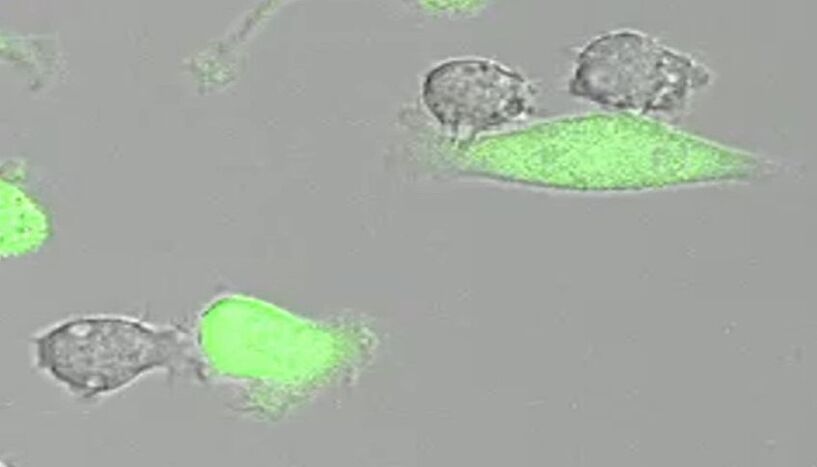Break through the tumor’s protective shield
12. Oktober 2021
Macrophages (grey) attacking tumor cells (green) © Manfred Ogris, Magdalena Billerhart, University of Vienna
A team at the Department for Pharmaceutical Sciences developed a therapy concept that could stop tumor growth.
The immune system protects the body from cancer. To protect healthy body cells from its own immune system, they have developed a protective shield: the protein CD47 is a so called "don’t eat me" signal, which tells the immune cells to stand back. Tumor cells exploit this CD47-based protection strategy for evading the immune system, by increasing presentation of CD47 on their cell surface. At the Department for Pharmaceutical Sciences, a team led by Manfred Ogris developed a therapy concept for programming the tumor cells to produce on their own a CD47-blocking and immune-activation fusion protein. This therapy approach could stop tumor growth.
On phagocytic cells, also called macrophages, and other immune cells the ligand for CD47, namely SIRPa, can be found. When SIRPα binds to CD47, this triggers a signal which prevents the killing of the target cell. Most tumor cells also produce high amounts of CD47 and hence prevent being attacked by immune cells. Current tumor therapies using antibodies could block CD47 and at the same time activate immune cells. Nevertheless, serious side effects to healthy organs and blood cells limit this approach.
The novel therapy concept presented here ensures that tumor cells on their own produce a CD47-blocking and immune activating protein. For this, scientists introduced a DNA gene vector into the tumor cells. DNA sequences were designed to ensure the expression of a protein with maximized CD47-blocking and immune activating properties. After successful DNA transfer, tumor cells produced and secreted the protein into the tumor vicinity.
Results: CD47 was successfully blocked not only on tumors cells producing the fusion protein but also on the tumor cells in their vicinity. Tumor growth was stopped and one third of tumors were eradicated, when applying this therapy in an in vivo model of highly malignant human breast cancer. "We observed a tumor infiltration of macrophages, which was due to the therapy. Also, other immune cells recognized and destroyed tumors cells marked with fusion protein. We were relieved, that we did not observe any organ related toxicities", Manfred Ogris explains. "Next we aim at a further optimization of this approach, which should enable further preclinical studies paving the way for a potential new tumor therapy."
Publication in Molecular Therapy Oncolytics:
CD47-targeted cancer immunogene therapy: secreted SIRPα-Fc fusion protein eradicates tumors by macrophage and NK cell activation: Manfred Ogris et al.
Wissenschaftlicher Kontakt
Univ.-Prof. Dipl.-Ing. Dr. Manfred Ogris
Department für Pharmazeutische ChemieUniversität Wien
1090 - Wien, Althanstraße 14 (UZA II)
+43-1-4277-55551
m.ogris@univie.ac.at
Rückfragehinweis
Mag. Alexandra Frey
Media Relations ManagerUniversität Wien
1010 - Wien, Universitätsring 1
+43-1-4277-17533
+43-664-8175675
alexandra.frey@univie.ac.at
Downloads:
Mac_attack_I.jpg
Dateigröße: 27,93 KB
Mac_attack_II.jpg
Dateigröße: 10,5 KB
